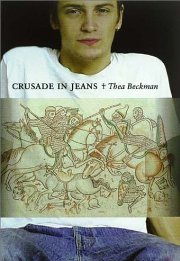 If you would ask us for our opinions about the best music (classic or pop), comics, films or literature, chances are the Dutch would come up with the names of British, American, Japanese, Belgian, French, German or Russian works. But when the Sargasso blog held a poll last month to determine the best children’s books, these were the results:
If you would ask us for our opinions about the best music (classic or pop), comics, films or literature, chances are the Dutch would come up with the names of British, American, Japanese, Belgian, French, German or Russian works. But when the Sargasso blog held a poll last month to determine the best children’s books, these were the results:
1. Thea Beckman – Crusade in Jeans (1973)
2. Roald Dahl – The BFG (1982)
3. Jan Terlouw – How to Become King (1971)
4. Paul Biegel – The Little Captain (1971)
5. Annie MG Schmidt – Tow Truck Pluck (1971)
6. Thea Beckman – Kinderen van Moeder Aarde (1985)
7. Antoine de Saint-Exupéry – The Little Prince (1943)
7. J.R.R. Tolkien – The Hobbit (1937)
9. Johan Fabricius – De Scheepsjongens van Bontekoe (1923)
10. J.R.R. Tolkien – The Lord of the Rings (trilogy) (1954)
11. Tonke Dragt – De Brief voor de Koning (1962)
12. Roald Dahl – Charlie and the Chocolate Factory (1964)
Note that the participants of this poll were most likely grown-ups, probably in full-on nostalgia mode. Curiously Swedish writer Astrid Lindgren (The Brothers Lionheart, Pippi Longstocking) is missing from the top ten. How Lisa Tetzner’s Die schwarzen Brüder could only land the 70th spot on a lefty blog like Sargasso will probably remain a mystery.
I was a child in the 1970s, and my Big Four of children’s literature were Paul Biegel, Guus Kuijer, Tonke Dragt and Miep Diekman. Biegel and Dragt wrote books with mystical elements, whereas Kuijer and Diekman were of a more realistic bent.
Currently Schmidt’s Tow Truck Pluck is being translated to English, and the Nederlands Letterenfonds has a glowing review of De Scheepsjongens van Bontekoe, which I guess means they are in the market for sponsoring translators.
(Photo: Wikipedia)
